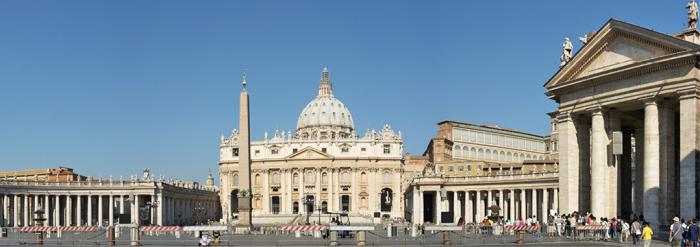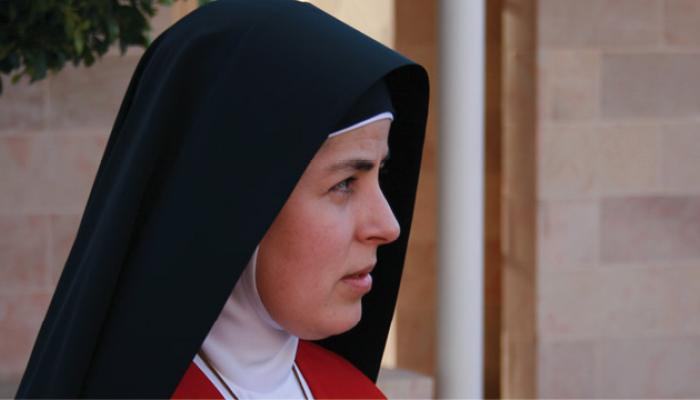
2.8 What is a nuncio?
The Church, or rather the Holy See, is represented by a nuncio. A nuncio is the contact person between the local Church on the one hand and the pope with the central Church government in Rome on the other. The nuncio has an important advisory role in the appointment of new bishops.
The nuncio also serves as an ambassador of the Holy See: he maintains diplomatic relations with the head of state of the country where he has been appointed as nuncio. The Church has diplomatic relations with about 180 countries.
What is the effect of ordination to the priesthood?
The anointing of the Spirit seals the priest with an indelible, spiritual character that configures him to Christ the priest and enables him to act in the name of Christ the Head. As a co-worker of the order of bishops he is consecrated to preach the Gospel, to celebrate divine worship, especially the Eucharist from which his ministry draws its strength, and to be a shepherd of the faithful. [CCCC 328]
How is the sacrament of Holy Orders celebrated?
The sacrament of Holy Orders is conferred, in each of its three degrees, by means of the imposition of hands on the head of the ordinand by the Bishop who pronounces the solemn prayer of consecration. With this prayer he asks God on behalf of the ordinand for the special outpouring of the Holy Spirit and for the gifts of the Spirit proper to the ministry to which he is being ordained. [CCCC 331]
Who can confer this sacrament?
Only validly ordained bishops, as successors of the apostles, can confer the sacrament of Holy Orders. [CCCC 332]
Who can receive this sacrament?
This sacrament can only be validly received by a baptized man. The Church recognizes herself as bound by this choice made by the Lord Himself. No one can demand to receive the sacrament of Holy Orders, but must be judged suitable for the ministry by the authorities of the Church. [CCCC 333]
Is it necessary to be celibate to receive the sacrament of Holy Orders?
It is always necessary to be celibate for the episcopacy. For the priesthood in the Latin Church men who are practicing Catholics and celibate are chosen, men who intend to continue to live a celibate life “for the kingdom of heaven” (Matthew 19:12). In the Eastern Churches marriage is not permitted after one has been ordained. Married men can be ordained to the permanent diaconate. [CCCC 334]
What are the degrees of the sacrament of Holy Orders?
The sacrament of Holy Orders has three degrees: bishop (episcopate), priest (presbyterate), deacon (diaconate). [Youcat 251]
What happens in episcopal ordination?
In episcopal ordination the fullness of the sacrament of Holy Orders is conferred upon a priest. He is ordained a successor of the apostles and enters the college of bishops. Together with the other bishops and the pope, he is from now on responsible for the entire Church. In particular the Church appoints him to the offices of teaching, sanctifying, and governing.
The episcopal ministry is the real pastoral ministry in the Church, for it goes back to the original witnesses to Jesus, the apostles, and continues the pastoral ministry of the apostles that was instituted by Christ. The pope, too, is a bishop, but the first among them and the head of the college. [Youcat 252]
How important for a Catholic Christian is his bishop?
A Catholic Christian feels that he is under an obligation to his bishop; the bishop is appointed for him, too, as Christ’s representative. Moreover, the bishop, who exercises his pastoral ministry together with priests and deacons as his ordained assistants, is the visible principle and the foundation of the local Church (diocese). [Youcat 253]
What happens in priestly ordination?
In priestly ordination the bishop calls down God’s power upon the candidates for ordination. It imprints upon the souls of these men an indelible seal that can never be lost. As a collaborator with his bishop, the priest will proclaim the word of God, administer the sacraments, and, above all, celebrate the Holy Eucharist.
During the celebration of a holy Mass, the actual ordination of priests begins when the candidates are called by name. After the bishop’s homily, the future priest promises obedience to the bishop and his successors. The actual ordination takes place through the imposition of the bishop’s hands and his prayer. [Youcat 254]
What happens in diaconal ordination?
In diaconal ordination the candidate is appointed to a special service within the sacrament of Holy Orders. For he represents Christ as the one who came, “not to be served but to serve, and to give his life as a ransom for many” (Mt 20:28). In the liturgy of ordination we read: “As a minister of the word, of the altar, and of charity, [the deacon] will make himself a servant to all.”
The original model of the deacon is the martyr St. Stephen. When the apostles in the original Church of Jerusalem saw that they were overwhelmed by their many charitable duties, they appointed seven men “to serve tables”, whom they then ordained. The first mentioned is Stephen: “full of grace and power”, he accomplished much for the new faith and for the poor in the Christian community. Over the centuries the diaconate became merely a degree of Holy Orders on the way to the presbyterate, but today it is once again an independent vocation for both celibates and married men. On the one hand, this is supposed to reemphasize service as a characteristic of the Church; on the other hand, it helps the priests, as in the early Church, by establishing an order of ministers who take on particular pastoral and social duties of the Church. Diaconal ordination, too, makes a lifelong, irrevocable mark on the ordained man. [Youcat 255]
Dear Papal Representatives, be the presence of Christ, be a priestly presence, as Pastors... who serve the Church, with the role to encourage, to be ministers of communion, and also with the not always easy task of reprimanding. Always do everything with deep love! Even in relations with the Civil Authorities and your Colleagues you are Pastors: always seek the good, the good of all, the good of the Church and of every person. [Pope Francis, To Nuncios, 21 June 2013]





